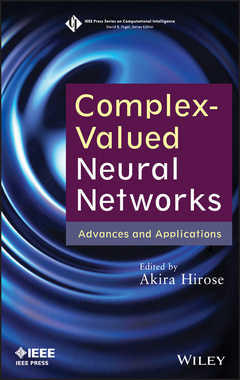Description
Complex-Valued Neural Networks
Advances and Applications
IEEE Press Series on Computational Intelligence Series
Coordinator: Hirose Akira
Language: English
Subjects for Complex-Valued Neural Networks:
Keywords
real-valued neural networks; Clifford-Algebraic Neural Networks; Quaternionic Neural Networks; optoelectronics; neural networks imaging; Neural networks sensing; artificial intelligence; artificial intelligence applications; neural networks applications; complex valued neural networks with multi valued neurons; neural network learning; pattern recognition and neural networks; ieee; ieee book; ieee series
304 p. · 16.3x24.1 cm · Hardback
Description
/li>Contents
/li>Biography
/li>
Presents the latest advances in complex-valued neural networks by demonstrating the theory in a wide range of applications
Complex-valued neural networks is a rapidly developing neural network framework that utilizes complex arithmetic, exhibiting specific characteristics in its learning, self-organizing, and processing dynamics. They are highly suitable for processing complex amplitude, composed of amplitude and phase, which is one of the core concepts in physical systems to deal with electromagnetic, light, sonic/ultrasonic waves as well as quantum waves, namely, electron and superconducting waves. This fact is a critical advantage in practical applications in diverse fields of engineering, where signals are routinely analyzed and processed in time/space, frequency, and phase domains.
Complex-Valued Neural Networks: Advances and Applications covers cutting-edge topics and applications surrounding this timely subject. Demonstrating advanced theories with a wide range of applications, including communication systems, image processing systems, and brain-computer interfaces, this text offers comprehensive coverage of:
- Conventional complex-valued neural networks
- Quaternionic neural networks
- Clifford-algebraic neural networks
Presented by international experts in the field, Complex-Valued Neural Networks: Advances and Applications is ideal for advanced-level computational intelligence theorists, electromagnetic theorists, and mathematicians interested in computational intelligence, artificial intelligence, machine learning theories, and algorithms.
Preface xv
1 Application Fields and Fundamental Merits 1
Akira Hirose
1.1 Introduction 1
1.2 Applications of Complex-Valued Neural Networks 2
1.3 What is a complex number? 5
1.4 Complex numbers in feedforward neural networks 8
1.5 Metric in complex domain 12
1.6 Experiments to elucidate the generalization characteristics 16
1.7 Conclusions 26
2 Neural System Learning on Complex-Valued Manifolds 33
Simone Fiori
2.1 Introduction 34
2.2 Learning Averages over the Lie Group of Unitary Matrices 35
2.3 Riemannian-Gradient-Based Learning on the Complex Matrix-Hypersphere 41
2.4 Complex ICA Applied to Telecommunications 49
2.5 Conclusion 53
3 N-Dimensional Vector Neuron and Its Application to the N-Bit Parity Problem 59
Tohru Nitta
3.1 Introduction 59
3.2 Neuron Models with High-Dimensional Parameters 60
3.3 N-Dimensional Vector Neuron 65
3.4 Discussion 69
3.5 Conclusion 70
4 Learning Algorithms in Complex-Valued Neural Networks using Wirtinger Calculus 75
Md. Faijul Amin and Kazuyuki Murase
4.1 Introduction 76
4.2 Derivatives in Wirtinger Calculus 78
4.3 Complex Gradient 80
4.4 Learning Algorithms for Feedforward CVNNs 82
4.5 Learning Algorithms for Recurrent CVNNs 91
4.6 Conclusion 99
5 Quaternionic Neural Networks for Associative Memories 103
Teijiro Isokawa, Haruhiko Nishimura, and Nobuyuki Matsui
5.1 Introduction 104
5.2 Quaternionic Algebra 105
5.3 Stability of Quaternionic Neural Networks 108
5.4 Learning Schemes for Embedding Patterns 124
5.5 Conclusion 128
6 Models of Recurrent Clifford Neural Networks and Their Dynamics 133
Yasuaki Kuroe
6.1 Introduction 134
6.2 Clifford Algebra 134
6.3 Hopfield-Type Neural Networks and Their Energy Functions 137
6.4 Models of Hopfield-Type Clifford Neural Networks 139
6.5 Definition of Energy Functions 140
6.6 Existence Conditions of Energy Functions 142
6.7 Conclusion 149
7 Meta-cognitive Complex-valued Relaxation Network and its Sequential Learning Algorithm 153
Ramasamy Savitha, Sundaram Suresh, and Narasimhan Sundararajan
7.1 Meta-cognition in Machine Learning 154
7.2 Meta-cognition in Complex-valued Neural Networks 156
7.3 Meta-cognitive Fully Complex-valued Relaxation Network 164
7.4 Performance Evaluation of McFCRN: Synthetic Complexvalued Function Approximation Problem 171
7.5 Performance Evaluation of McFCRN: Real-valued Classification Problems 172
7.6 Conclusion 178
8 Multilayer Feedforward Neural Network with Multi-Valued Neurons for Brain-Computer Interfacing 185
Nikolay V. Manyakov, Igor Aizenberg, Nikolay Chumerin, and Marc M. Van Hulle
8.1 Brain-Computer Interface (BCI) 185
8.2 BCI Based on Steady-State Visual Evoked Potentials 188
8.3 EEG Signal Preprocessing 192
8.4 Decoding Based on MLMVN for Phase-Coded SSVEP BCI 196
8.5 System Validation 201
8.6 Discussion 203
9 Complex-Valued B-Spline Neural Networks for Modeling and Inverse of Wiener Systems 209
Xia Hong, Sheng Chen and Chris J. Harris
9.1 Introduction 210
9.2 Identification and Inverse of Complex-Valued Wiener Systems 211
9.3 Application to Digital Predistorter Design 222
9.4 Conclusions 229
10 Quaternionic Fuzzy Neural Network for View-invariant Color Face Image Recognition 235
Wai Kit Wong, Gin Chong Lee, Chu Kiong Loo, Way Soong Lim, and Raymond Lock
10.1 Introduction 236
10.2 Face Recognition System 238
10.3 Quaternion-Based View-invariant Color Face Image Recognition 244
10.4 Enrollment Stage and Recognition Stage for Quaternion- Based Color Face Image Correlator 255
10.5 Max-Product Fuzzy Neural Network Classifier 260
10.6 Experimental Results 266
10.7 Conclusion and Future Research Directions 274
References 274
Index 279
AKIRA HIROSE, PhD, is a Professor in the Department of Electrical Engineering and Information Systems, the University of Tokyo, Japan. His main fields of interest are wireless electronics and neural networks on which he has published several books. Dr. Hirose is a Fellow of the IEEE, a senior member of the IEICE, and Vice President of the Japanese Neural Network Society.
All contributors are members of the Task Force on Complex-Valued Neural Networks, IEEE Computational Intelligence Society Neural Network Technical Committee.

